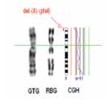The use of comparative genomic hybridization as a diagnostic tool in medical genetics laboratories: first application on different clinical samples
Uporaba primerjalne genomske hibridizacije kot diagnostične metode v medicinskem genetskem laboratoriju: prva uporaba na različnih kliničnih vzorcih
Abstract
Purpose: Comparative genomic hybridization (CGH) is a molecular-cytogenetic technique used to identify chromosomal imbalances throughout a genome. Due to its complexity, the use of CGH as a regular diagnostic technique is limited to only a few diagnostic laboratories. In this study, we evaluated the potential applications of CGH as a diagnostic method in different post-natal clinical samples.
Methods: Ten patients were recruited with submicroscopic chromosomal abnormalities ranging in size from 3.9 to 37 Mb. For the purpose of confirmation, CGH was applied to five cases where molecular karyotyping with MLPA was previously utilized to detect chromosome aneuploidy. To date, CGH was largely used for the identification of the complex karyotype in haematological malignancies.
Results: In eight cases of haematological malignancies, we were able to resolve complex karyotypes with CGH. Utilizing CGH as a diagnostic tool, we detected chromosomal imbalances larger than 8 Mb. In addition, we confirmed all chromosomal aneuploidies that were previously detected with MLPA from embryonic tissues obtained from aborted fetuses. In this tissue, the cells were not mitotically active, and therefore, were inappropriate for the conventional cytogenetics.
Conclusion: Because CGH is technically demanding and time consuming, this technique is likely to be inappropriate for screening purposes. However, we found that CGH may be very useful in sporadic cases, where the sample material is not mitotically active or in cases with complex karyotypes. Therefore, our results confirmed that CGH may be useful in laboratories that are unable to use micro-array CGH for economic reasons.
Downloads

Copyright (c) 2011 Acta Medico-Biotechnica

This work is licensed under a Creative Commons Attribution 4.0 International License.